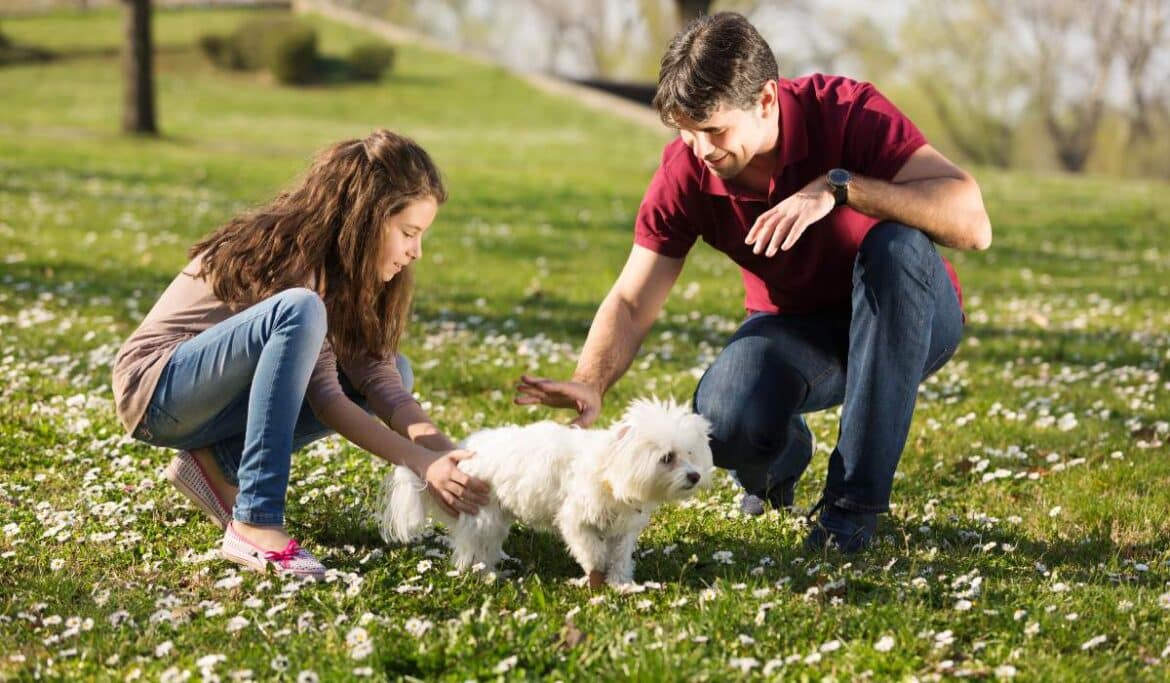Are you a new dog owner? Have you ever wondered why socializing puppies is so important? Well, let me tell you, it's not just about having a cute and well-behaved companion. Early and varied socialization plays a crucial role in the development of our furry friends.
Puppies are like sponges, soaking up experiences and learning from every interaction they have. By exposing them to different people, animals, and environments at an early age, we're helping them build the necessary skills to navigate the world around them. This means introducing your puppy to old puppies, other dogs of various breeds, and even different types of people.
Proper socialization reduces the risk of behavior problems later on. According to the American Veterinary Society of Animal Behavior (AVSAB), puppies that aren't adequately socialized are more likely to develop fear or aggression issues as they grow older. So whether you're getting your puppy from breeders or adopting one from a shelter, make sure to prioritize their socialization.
Remember, by giving your puppy plenty of positive experiences during their formative months, you're setting them up for a lifetime of happiness and harmony. So let's dive into some common mistakes we make when socializing puppies and how to avoid them.
Now that we understand why early and varied socialization is essential for our furry companions' development let's explore some common mistakes we tend to make along the way.
Starting Socialization Early: Avoiding the Mistake of Delaying
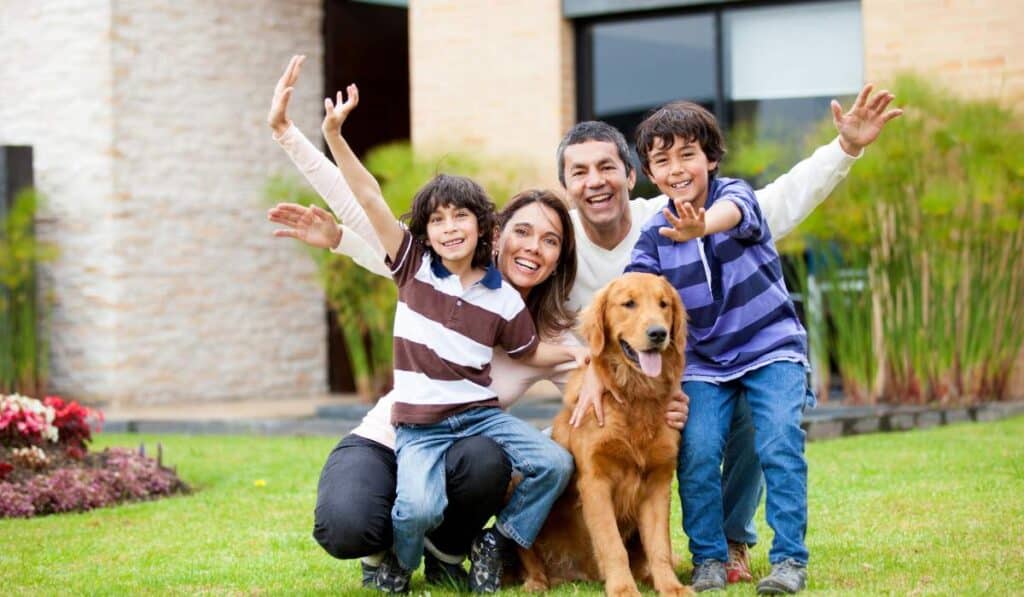
Begin socializing puppies as early as possible
One of the biggest mistakes we make is delaying the process. Puppies are like sponges during their early developmental stages, and exposing them to various experiences and environments is crucial for their overall well-being. By starting socialization early, preferably within the first few months of a puppy's life, we can help them grow into confident and well-adjusted adult dogs.
Delaying socialization can lead to fear and anxiety in puppies
If we miss out on opportunities to socialize our puppies during their critical developmental period, they may become fearful or anxious in new situations later in life. Puppies who haven't been properly socialized may display signs of aggression or fear when encountering new people, animals, or environments. This can make everyday activities such as going for walks or meeting new friends a stressful experience for both the puppy and its owner.
Early socialization sets a foundation for positive experiences
Socializing puppies early on sets the stage for positive experiences throughout their lives. It helps them build confidence, learn appropriate behavior around other dogs and humans, and develop coping mechanisms for different situations. By gradually exposing them to various stimuli in a controlled and positive manner, we can help them become more adaptable and resilient.
To ensure successful early socialization, here are some tips:
- Introduce your puppy to different people: Encourage gentle interactions with children, adults of all ages, men, women, and people wearing hats or glasses. Expose them to different voices by having friends come over or taking them to busy parks.
- Expose your puppy to various environments: Take your puppy on car rides so they get used to motion and travel. Visit different places such as parks, pet-friendly stores, and cafes with outdoor seating areas where they can observe new sights, sounds, and smells.
- Arrange playdates with other puppies: Interactions with other puppies are essential for your puppy's social development. Organize playdates with well-vaccinated and friendly pups to allow them to learn appropriate play behaviors and canine communication.
- Enroll in puppy training classes: These classes not only provide basic obedience training but also expose your puppy to new people, dogs, and controlled environments. They offer a structured setting for learning and socializing in a safe environment.
- Reward positive behavior: When your puppy reacts positively to new experiences or encounters, reward them with treats, praise, and affection. This helps reinforce their confidence and encourages them to view new situations as positive opportunities rather than threats.
By starting socialization early and avoiding the mistake of delaying it, you give your puppy the best chance at becoming a well-rounded adult dog who can confidently handle various situations they may encounter throughout their lives. Remember, every interaction counts.
So don't wait! Start socializing your furry friend today for a lifetime of positive experiences!
Gradual Exposure: Preventing Overwhelming Experiences for Puppies
Introduce New Environments, People, and Animals Gradually
One of the most common mistakes we make is rushing their exposure to new environments, people, and animals. While it's important for puppies to have positive experiences with a variety of stimuli, overwhelming them can lead to fear or aggression later in life. To prevent this, it's crucial to introduce new experiences gradually.
Start by exposing your puppy to familiar environments with minimal distractions. Allow them to explore at their own pace and reward them with treats and praise for calm behavior. Once they are comfortable in these settings, slowly introduce more challenging environments such as parks or busy streets.
Similarly, when introducing your puppy to new people and animals, take it slow. Begin with individuals who are calm and experienced with dogs. Let your puppy approach them at their own pace and reward positive interactions. As they become more confident, gradually expose them to different types of people – children, and elderly individuals – ensuring each encounter is a positive experience.
Build Confidence Through Slowly Increasing Exposure
Just like humans, puppies gain confidence through overcoming challenges. By gradually increasing exposure to different situations and stimuli, you can help build your puppy's confidence and resilience.
For example:
- If your puppy is initially uncomfortable around loud noises like vacuum cleaners or thunderstorms, start by playing recordings of these sounds at a low volume while providing treats or engaging in playtime.
- As they become more accustomed to the sounds at a low volume without showing signs of distress (such as hiding or excessive barking), gradually increase the volume over time.
- This gradual exposure will help desensitize your puppy to loud noises and build their confidence in handling unexpected sounds.
Another aspect of building confidence is exposing your puppy to various textures under its paws. Walk on different surfaces such as grass, sand, gravel, and even hardwood floors. This will help them develop resilience and adaptability to different terrains.
Avoiding Fear and Aggression by Preventing Negative Experiences
Negative experiences during socialization can have long-lasting effects on a puppy's behavior. Rushing the process or exposing them to overwhelming situations can lead to fear or aggression towards certain stimuli.
To prevent negative experiences, it's essential to closely monitor your puppy's reactions during socialization. If you notice signs of fear or discomfort, such as cowering, growling, or excessive panting, remove them from the situation immediately and provide comfort in a familiar environment.
Consider seeking guidance from a professional dog trainer or veterinarian experienced in puppy socialization. They can provide valuable insights and techniques for gradual exposure that align with your puppy's specific needs.
Remember that every puppy is unique, and their tolerance for new experiences may vary. Be patient and understanding throughout the socialization process, allowing your furry friend to develop at their own pace.
Variety is Key: Ensuring a Range of People, Animals, and Environments
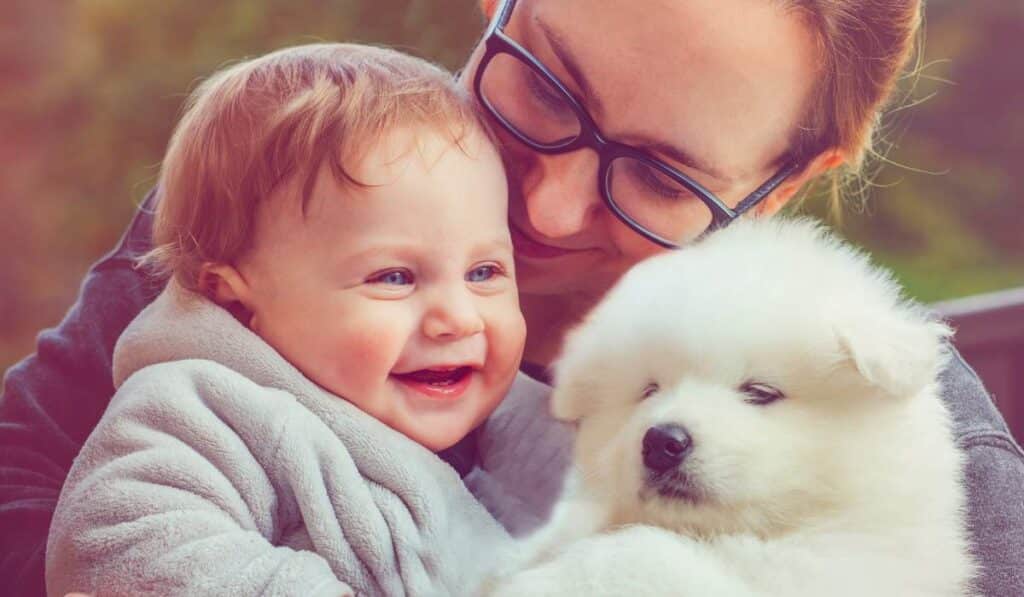
Expose puppies to different types of people, including children and strangers.
It's crucial to introduce them to a variety of people. By exposing them to different types of individuals, you help them become comfortable in various social situations. This will prevent them from developing fear or aggression towards certain groups later in life.
Here are some examples of the types of people you should expose your puppy to:
- Children: Let your puppy interact with kids of different ages. This will teach them how to behave around little humans and reduce the risk of nipping or rough play.
- Strangers: Encourage friendly interactions between your puppy and unfamiliar faces. This will help them learn that meeting new people is a positive experience.
Introduce puppies to various animals like cats, birds, or livestock.
Socializing puppies with other animals is essential for their overall development and behavior. It helps them understand appropriate boundaries and builds their confidence when interacting with different species.
Consider exposing your puppy to these animals:
- Cats: Allow supervised interactions between your puppy and cats. This teaches them how to coexist peacefully with feline friends.
- Birds: Introduce your pup to birds by taking walks near aviaries or introducing them to pet birds owned by friends or family members.
- Livestock: If you have access to farms or rural areas, introduce your pup gently to farm animals like cows, sheep, or horses.
Provide opportunities for puppies to experience different environments such as parks or busy streets.
To ensure well-rounded socialization, it's important for puppies to encounter various environments. Exposure helps build their resilience and adaptability while preventing anxiety in new places.
Here are some environments you can expose your pup to:
- Parks: Take regular trips to local parks where they can meet other dogs and observe nature.
- Busy streets: Gradually introduce your puppy to busy streets with lots of pedestrians and traffic. This will help them become accustomed to urban environments.
- Stores: Bring your pup to pet-friendly stores where they can experience different sights, sounds, and smells.
Remember, socializing puppies should be a positive experience. Always monitor their interactions and provide plenty of rewards and praise for good behavior.
By ensuring a range of people, animals, and environments in your puppy's socialization journey, you are setting them up for a confident and well-adjusted life ahead. So go out there, have fun with your furry friend, and create memorable experiences together!
Balancing Comfort and Challenge: Avoiding Pushing Too Hard or Too Little
Finding the right balance when socializing puppies is crucial. It's important to expose them to new experiences without overwhelming them, while also providing enough challenge to help them grow and learn. Here are some tips on how to strike that balance.
Gradually Increase Difficulty Levels
When training your puppy, it's essential to gradually increase the difficulty levels. Start with simple tasks and then progress to more challenging ones as they become comfortable. This approach ensures that they are constantly challenged but not frustrated.
For example:
- Begin by teaching basic commands like "sit" and "stay."
- Once they have mastered these commands, introduce more complex tricks such as "rollover" or "fetch."
- As they continue to improve, add distractions during training sessions to test their focus and obedience.
By incrementally increasing the difficulty level, you provide your puppy with a sense of accomplishment while keeping them engaged in the learning process.
Adjust Based on Individual Comfort Zones
Every puppy is unique, so it's crucial to adjust the level of challenge based on their comfort zone. Some puppies may be naturally more sensitive or cautious than others. Pay attention to their body language and behavior cues during socialization exercises.
Here's what you can do:
- If your puppy seems overwhelmed or anxious in certain situations, take a step back and provide a safe space for them.
- Slowly reintroduce the activity or environment at their own pace until they feel comfortable.
- Gradually increase exposure over time as they gain confidence.
Remember that pushing too hard can lead to fear or aggression issues, while not challenging them enough can result in boredom and lack of growth. Finding the right balance ensures a positive socialization experience for your furry friend.
Make it Fun!
Socializing should be an enjoyable experience for both you and your puppy. Incorporate play into training sessions whenever possible. This not only keeps them engaged but also strengthens the bond between you.
Consider these ideas:
- Use interactive toys during training to make it more exciting.
- Take your puppy on playdates with other well-socialized dogs for supervised interactions.
- Organize puppy parties or playgroups where they can learn to interact with different people and animals in a controlled environment.
By making socialization fun, you create positive associations and help your puppy develop good social skills.
Provide Opportunities for Controlled Running and Play
Puppies have the energy to spare, so it's essential to provide opportunities for controlled running and play. This helps them burn off excess energy while learning appropriate behavior.
Here's how:
- Find a safe, enclosed area where your puppy can run freely without the risk of getting lost or injured.
- Engage in games like fetch or hide-and-seek to keep them mentally stimulated.
- Arrange playdates with other puppies or well-behaved adult dogs for social interaction and exercise.
Remember that puppies need both mental and physical stimulation, so incorporating playtime into their routine is crucial for their overall well-being.
Correcting Misbehavior: Effective Approaches for Fearful Puppies
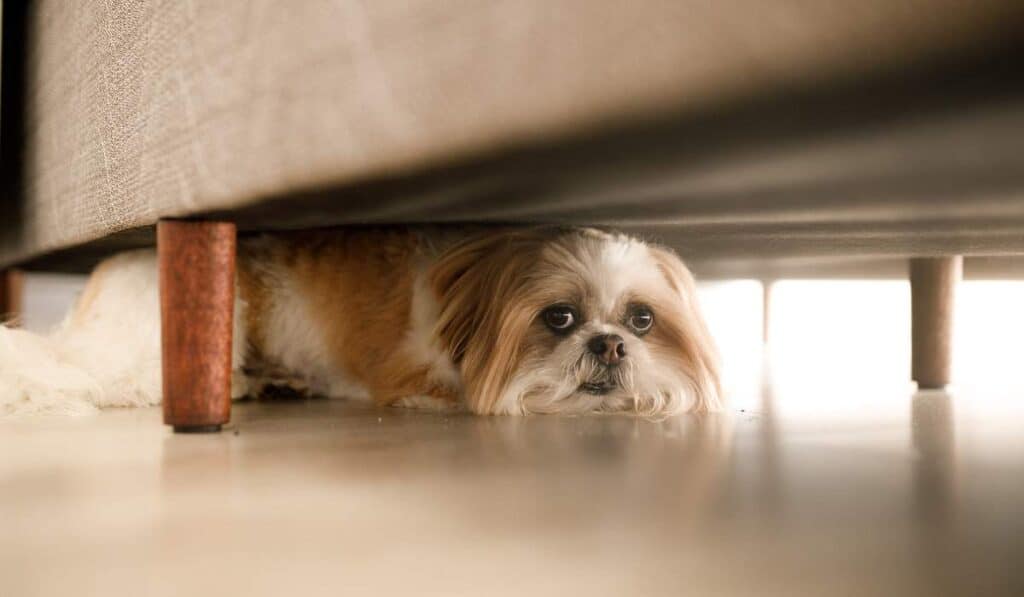
Treat fearful behaviors with patience and positive reinforcement rather than punishment.
It's important to approach fearful behaviors with patience and positivity. Punishment can create more fear and anxiety in a puppy, making the situation worse. Instead, focus on rewarding good behavior and using positive reinforcement techniques.
One effective approach is to use treats as rewards when your puppy displays confidence or overcomes their fears. For example, if your pup approaches a new person without showing signs of fear, reward them with a tasty treat. This helps them associate positive experiences with social interactions.
Another technique is counterconditioning, which involves pairing the presence of something that scares your puppy with something they love. For instance, if your pup is afraid of loud noises like thunderstorms, play soothing music or offer them a special toy during these situations. Gradually increase the exposure to the noise while providing positive reinforcements to help them overcome their fear.
Distract fearful puppies with toys or treats during stressful situations.
When socializing a fearful puppy, it's essential to provide distractions during stressful situations. Toys or treats can redirect their attention away from what's causing them anxiety and help alleviate their fear.
Keep a supply of engaging toys on hand that are specifically designed for anxious dogs. These toys often have features like hidden treats or puzzle elements that keep puppies occupied and mentally stimulated. When you notice your pup becoming anxious or displaying signs of fear, offer them one of these toys as a distraction.
Treats can also be used as effective distractions during socialization exercises. If your puppy becomes nervous around other dogs or strangers, carry small treats in your pocket and offer them when they exhibit calm behavior. This not only distracts them from their fears but also reinforces positive associations with those particular situations.
Avoid forcing fearful pups into uncomfortable situations; instead, create positive associations gradually.
It's crucial to avoid forcing fearful puppies into uncomfortable situations. Forcing them can intensify their fear and make socialization even more challenging. Instead, focus on creating positive associations gradually.
Start by exposing your puppy to mild versions of the situations they find intimidating. For example, if your pup is afraid of strangers, begin by having a trusted friend or family member approach them slowly and calmly. Reward your puppy with treats and praise for any signs of calmness or curiosity.
As your puppy becomes more comfortable, gradually increase the intensity of the situation. Introduce them to a wider range of people or take them to busier locations as they gain confidence. Remember to always reward positive behavior and provide plenty of reassurance along the way.
Expanding Beyond Dog Parks: Great Places for Puppy Socialization
Take your puppy on walks in busy areas with lots of people passing by.
Taking your puppy on walks in busy areas is a fantastic way to socialize them and expose them to different sights, sounds, and smells. The hustle and bustle of a busy street or park can help your puppy become more comfortable around strangers and learn how to navigate through various environments. Here are some tips for successful walks:
- Choose a park or street with heavy foot traffic to ensure plenty of opportunities for interaction.
- Keep your puppy on a leash and encourage positive interactions with passersby.
- Reward your puppy with treats or praise when they exhibit calm behavior during the walk.
- Gradually increase the duration of the walks as your puppy becomes more comfortable in different settings.
Socialize your puppy in controlled environments like puppy classes or training sessions.
Puppy classes or training sessions provide controlled environments where puppies can interact with other dogs under the guidance of experienced trainers. These settings offer valuable learning experiences that can help shape your pup's behavior and social skills. Consider the following when enrolling your puppy in such programs:
Expose your puppy to different surfaces such as grass, sand, or pavement.
Introducing puppies to various surfaces is crucial for their development and adaptability. By exposing them early on, you can prevent fear or anxiety related to unfamiliar textures later in life. Here are some ideas for surface exposure:
- Take your pup for walks on grassy fields, sandy beaches, gravel paths, or concrete sidewalks.
- Create an obstacle course at home using different surfaces like carpet, tile, or hardwood floors.
- Utilize platforms or ramps to introduce your puppy to elevated surfaces.
- Gradually increase the difficulty level as your puppy becomes more comfortable with each surface.
By expanding beyond traditional dog parks and exploring new places for socialization, you can provide your puppy with a well-rounded experience that prepares them for various real-world situations. Remember that each dog is unique, so be patient and tailor the socialization process to suit your pup's individual needs.
Key Takeaways on Successful Puppy Socialization
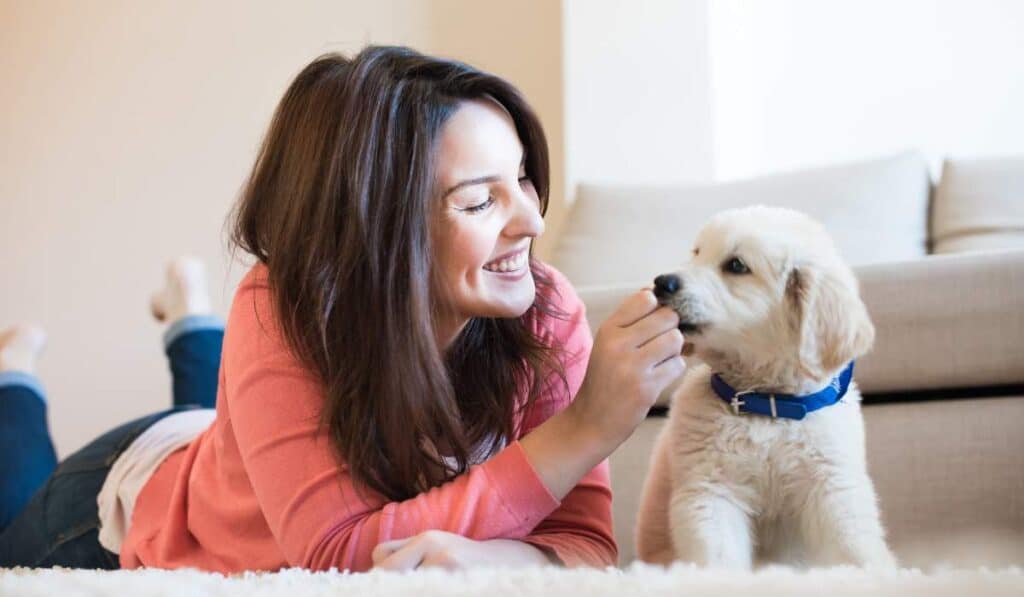
Early and varied socialization is essential for a well-adjusted adult dog.
Socializing your puppy from an early age is crucial to ensure they grow up into well-adjusted adult dogs. Exposing them to different environments, people, and animals helps them develop the necessary social skills and confidence to navigate the world around them. By introducing your puppy to various situations, you are setting them up for success in their future interactions.
To achieve successful socialization, start by gradually exposing your puppy to new experiences. Begin with controlled environments such as your home or backyard before venturing out into busier places like parks or pet-friendly stores. This gradual approach allows your puppy to build positive associations with new surroundings without overwhelming them.
When introducing your puppy to new people, encourage positive experiences by having individuals offer treats or playtime. This helps create a positive association between strangers and enjoyable interactions. Remember that each interaction should be brief at first, gradually increasing in duration as your puppy becomes more comfortable.
Gradual exposure helps prevent fear and anxiety in puppies.
One of the biggest mistakes we make when socializing puppies is rushing the process. Forcing them into unfamiliar situations too quickly can lead to fear and anxiety, which may have long-lasting effects on their behavior as adults. It's important to remember that every pup has its own unique pace of learning and adapting.
To prevent fear and anxiety during socialization, pay close attention to your puppy's body language. Signs of stress include cowering, trembling, excessive panting, or attempting to hide behind you. If you notice any of these signs, it's essential to remove your puppy from the situation immediately and provide reassurance in a calm environment.
Balancing comfort and challenge ensures optimal growth during socialization.
While it's important not to overwhelm your puppy during socialization, it's equally vital not to shelter them entirely from challenging experiences. Striking a balance between comfort and challenge is key to their growth and development.
During socialization, gradually introduce your puppy to new stimuli, such as different sounds, surfaces, or objects. For example:
- Introduce them to various types of flooring (carpet, hardwood, tile) to help them become comfortable walking on different surfaces.
- Expose them to different sounds like vacuum cleaners, doorbells, or thunderstorms by playing recordings at a low volume initially and gradually increasing the intensity.
- Allow them to explore various textures by providing toys with different materials (plush, rubber) or taking them for walks in grassy areas.
By gradually challenging your puppy in a controlled manner, you can build their confidence and resilience while ensuring they feel safe throughout the process.
Conclusion
To ensure successful puppy socialization, it's crucial to avoid common mistakes that can hinder their development. By starting socialization early, you can prevent the mistake of delaying this important process. Gradual exposure is key to preventing overwhelming experiences for your furry friend. Make sure to provide a variety of people, animals, and environments to broaden their social skills. Balancing comfort and challenge will help you avoid pushing your puppy too hard or providing too little stimulation. AndEffective approaches for fearful puppies are essential.
Expanding beyond dog parks opens up a world of possibilities for puppy socialization. There are plenty of great places where your pup can interact with other dogs and people while exploring new surroundings. Remember, the goal is to create positive experiences that will shape their behavior and confidence.
In summary, successful puppy socialization requires starting early, gradual exposure, variety in interactions, balanced challenges, and effective correction methods for misbehavior. By following these guidelines and avoiding common mistakes, you'll be setting your pup up for a lifetime of confident and well-adjusted social interactions.
Now that you have a better understanding of how to navigate the world of puppy socialization without making common mistakes, it's time to put this knowledge into action! Take the initiative to expose your pup to different people, animals, and environments regularly. Seek out opportunities for them to interact with other dogs outside of dog parks as well.
Remember that every interaction counts towards shaping their behavior and ensuring they grow into happy and sociable adult dogs. Start today by implementing these strategies and enjoy watching your furry friend thrive!
Frequently Ask Questions (FAQs)
How early should I start socializing my puppy?
It's best to start socializing your puppy as early as possible—ideally between 3-14 weeks old when they are most receptive to new experiences.
What if my puppy seems overwhelmed during socialization?
If your puppy appears overwhelmed, take a step back and provide them with a calmer environment. Gradually reintroduce socialization opportunities at a pace that they can handle comfortably.
Can I solely rely on dog parks for puppy socialization?
While dog parks can be beneficial, it's important to expose your puppy to a variety of environments, including different neighborhoods, public spaces, and even indoor settings to ensure well-rounded socialization.
How do I correct misbehavior during socialization?
When correcting misbehavior during socialization, focus on positive reinforcement and redirection techniques. Avoid punishment-based approaches as they can create fear or anxiety in your puppy.
What are some great places for puppy socialization beyond dog parks?
Consider taking your puppy to pet-friendly stores, outdoor cafes, training classes, or even arranging playdates with other vaccinated and friendly dogs in controlled environments.

